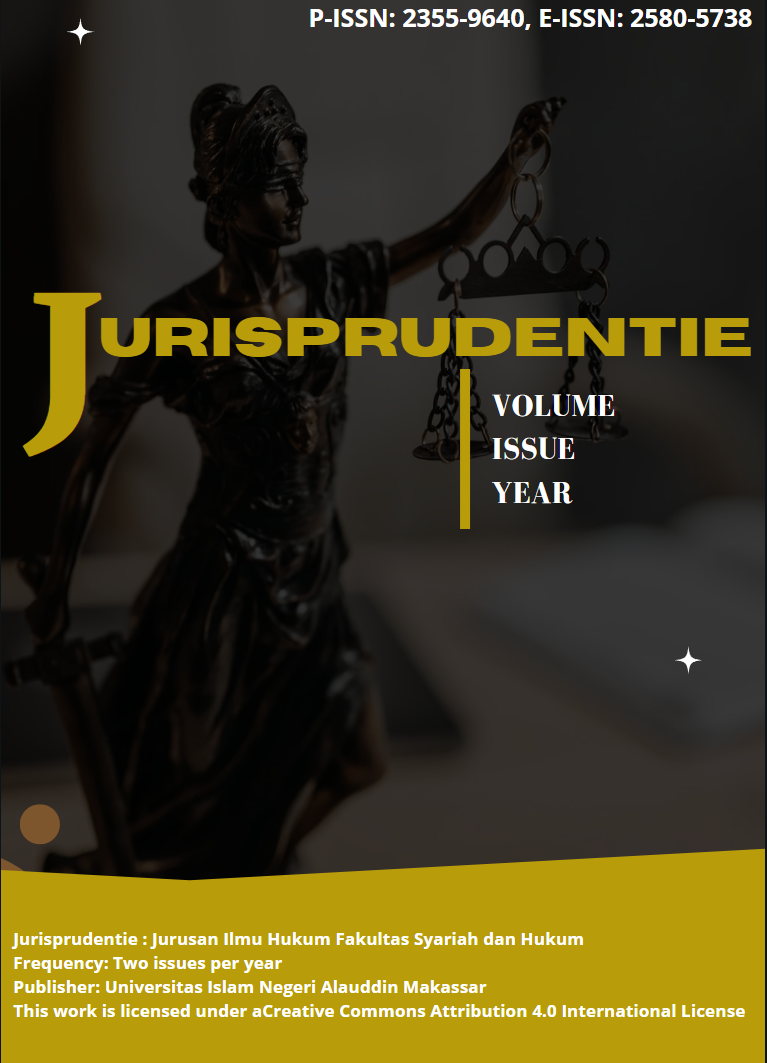Implementation Of Development Of Integrity Zones Towards Wbk (Corruption-Free Area) And Wbbm (Clean Service Bureaucracy Area) In Implementation Of Government To Fulfill The Community's Rights To
Abstract
The Government of Indonesia's efforts to reform the bureaucracy is not something new. For the public to feel the results of the acceleration of Bureaucratic Reform that has been carried out by the government, especially in work units, the Ministry of Empowerment of State Apparatus and Bureaucratic Reform (Ministry of PAN RB) has issued Ministerial Regulation of PAN RB No. 52 of 2014 concerning Guidelines for the Development of an Integrity Zone towards a Corruption-Free Area and a Clean Bureaucratic Area Serving in Government Agencies, which was later refined by Ministerial Regulation of PAN RB No. 10 of 2019. In the context of the right to public services as a constitutional right of every citizen, can the development of this integrity zone be able to solve the problem of the poor quality of public services by the government? The research method used is a qualitative research method with a statutory approach and then analyzes the implementation in the field. The results of the study indicate that the current Integrity Zone implementation has not been maximized in fulfilling the constitutional rights of citizens related to public services and the fulfillment of economic, social, cultural rights (ekosob) as implications for public services. This is due to several reasons that the Integrity Zone evaluation notes. Therefore, the formulation of a strategy to accelerate the Integrity Zone needs to be carried out as a solution for providing appropriate public services.
References
Journal:
Bambang, L. d. (2017). “Strategi Dynamic Governance Dalam Penyelengaraan Pemerintahan Provinsi Jawa Barat”. Jurnal Ilmiah Ilmu Pemerintahan, 3(3).
Bintoro., D. d. (2021). “Analisis Penerapan Good Corporate Governance (GCG) Melalui Reformasi Birokrasi Menuju Wilayah Bebas Korupsi dan Wilayah Birokrasi Bersih dan Melayani (WBK/WBBM). Jurnal Ilmiah Indonesia, 6(6) .
dkk., R. d. (2019). “Implementasi Pembangunan Zona Integritas Menuju Wilayah Bebas dari Korupsi dan Wilayah Birokrasi Bersih dan Melayani di BBWS Pemali Juana Semarang”. Dialogue Jurnal Ilmu Administrasi Publik 1 (1).
Hapsari, Julia, Hartuti Purnaweni, and Budi Puspo Priyadi. "Implementasi Pembangunan Zona Integritas Menuju Wilayah Bebas Dari Korupsi Dan Wilayah Birokrasi Bersihdan Melayani Di Bbws Pemali Juana Semarang." Dialogue: Jurnal Ilmu Administrasi Publik 1.1 (2019).
Hanafi, Andhi Sukma. "Pelaksanaan reformasi birokrasi dengan pembangunan zona integritas pada Kementerian Perindustrian." JIKAP (Jurnal Informasi Dan Komunikasi Administrasi Perkantoran) 4.1 (2020).
Haryadi, Wresni, Abdul Rahman Jannang, and Rahmat Sabuhari. "Analisis Pelaksanaan Zona Integritas di Kepolisian Resor Ternate Guna Terwujudnya Wilayah Bebas dari Korupsi." Jurnal Ilmiah Wahana Pendidikan 8.2 (2022).
Ifada, Taufilillah, Sukarno Hardjo Soewito, and Adi Soesiantoro. "Penerapan Pedoman Pembangunan Zona Integritas Menuju Wbk Dan Wbbm: Studi Kasus Di Biro Organisasi Sekretariat Daerah Provinsi Jawa Timur." PRAJA observer: Jurnal Penelitian Administrasi Publik (e-ISSN: 2797-0469) 1.03 (2021).
Kinasih, Wihardiasty Sekar Kinasih Wihardiasty Sekar, and Sujianto Sujianto. "Pelaksanaan Pembangunan Zona Integritas Menuju Wilayah Bebas Korupsi Dan Wilayah Birokrasi Bersih Melayani Di Kantor Imigrasi Kelas I Tpi (Tempat Pemeriksaan Imigrasi) Pekanbaru." PUBLIKA: Jurnal Ilmu Administrasi Publik 8.1 (2022).
Muhaimin. (2018). “Penguatan Penyelenggaraan Pelayanan Publik Melalui Penyelesaian Sengketa Informasi Publik". Jurnal Imiah Kebijakan Hukum, 12(2).
Sinaga, Edward James, and Indonesia Jalan HR Rasuna Said Kav. "Aktualisasi Tata Nilai ‘PASTI’dalam Mewujudkan Wilayah Bebas dari Korupsi serta Wilayah Birokrasi Bersih dan Melayani." Jurnal Ilmiah Kebijakan Hukum 13.1 (2019): 31.
Sukmana, O. (2016). “Konsep dan Desain Negara Kesejahteraan (Welfare State)”. Jurnal Sospol, 2(1), 103-122.
Yusdianto, B. M. (2015). “Hubungan Kewenangan Pusat dan Daerah Menurut UU No. 23 Tahun 2014 tentang Pemerintahan Daerah”. Padjajaran Journal of Law, 2(3).
Wilujeng, Deva Sasti, and Octavia Lhaksmi Pramudyastuti. "Evaluasi Penerapan Zona Integritas Menuju Wilayah Bebas Dari Korupsi dan Wilayah Birokrasi Bersih Melayani (Studi Pembangunan Zona Integritas Rumah Sakit Jiwa Prof. Dr. Soerojo Magelang)." Journal of Economic, Management, Accounting and Technology 3.2 (2020).
Book :
Assiddiqie, J. (2012). Perkembangan dan Konsolidasi Lembaga Negara Pasca Reformasi, Cetakan Kedua. Jakarta: Sinar Grafika.
Dwiyanto, A. (2013). Mengembalikan Kepercayaan Publik Melalui Reformasi Birokrasi. Jakarta: PT. Gramedia Pustaka Utama.
Magunsong, N. (2010). Hukum Tata Negara I. Yogyakarta: Fakultas Syari’ah dan Hukum Press.
Zauhar, S. (2002). Reformasi Administrasi Konsep, Dimensi dan Strategi. Jakarta : PT Bumi Aksara.
Website:
(n.d.). Retrieved from https://ombudsman.go.id/artikel/r/artikel--filosofi-pengawasan-pelayanan-publik.
Once an article was published in the journal, the author(s) are:
- to retain copyright and grant to the journal right licensed under Creative Commons License Attribution that allows others to share the work with an acknowledgement of the work's authorship.
- permitted to publish their work online in third parties as it can lead wider dissemination of the work, with an acknowledgement of its initial publication in this journal
- continue to be the copyright owner and allow the journal to publish the article with the CC BY license
- receiving a DOI (Digital Object Identifier) of the work.


